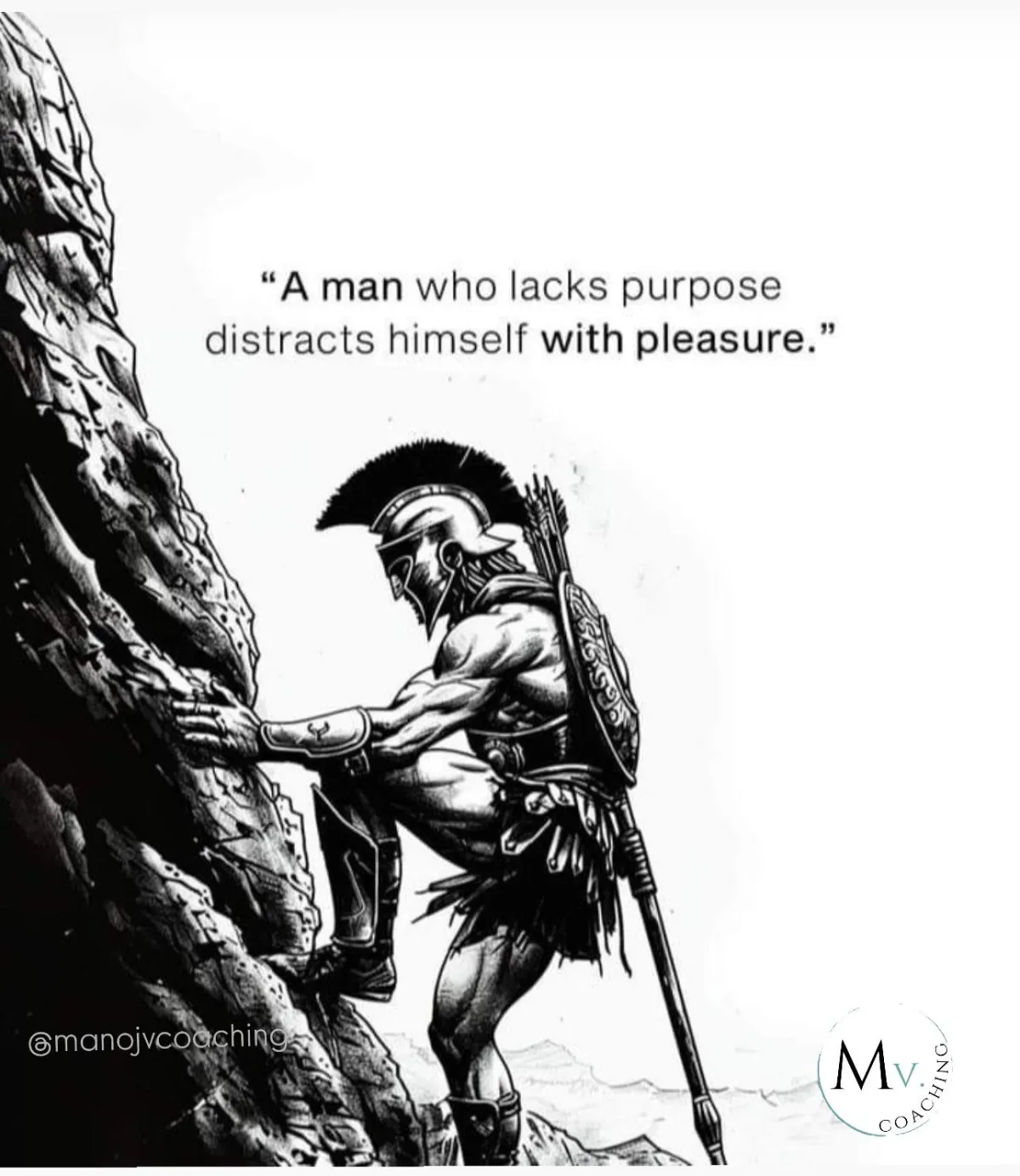
"A Man Who Lacks Purpose Distracts Himself with Pleasure"
The quote “a man who lacks purpose distracts himself with pleasure” speaks volumes about the human condition. When we’re disconnected from a higher goal or sense of purpose, we often seek out distractions to fill the void—whether it’s social media, binge-watching TV, or indulging in unhealthy habits. The Stoics understood this well, and modern neuroscience backs it up. If you’re not pursuing meaningful work, it’s all too easy to lose yourself in fleeting pleasures. This article explores how lacking purpose can lead to a cycle of distraction, the neuroscience behind addictive behaviors, and how you can take practical steps to discover and cultivate your purpose.
The Stoic Perspective on Purpose
Stoic philosophy emphasizes the importance of living with purpose. As Marcus Aurelius once said, “Waste no more time arguing about what a good man should be. Be one.” The Stoics believed that a purposeful life is essential for true happiness and fulfillment. Without purpose, the mind becomes restless, seeking comfort in short-term pleasures instead of long-term growth. Epictetus echoed this sentiment, saying, “People are not disturbed by things, but by the views they take of them.” A person without purpose is more likely to chase after distractions, mistaking temporary pleasure for lasting happiness.
Neuroscience of Addiction and Distraction
Modern neuroscience provides insight into why we turn to distractions when we lack purpose. The brain's reward system is driven by dopamine, a chemical that makes us feel good when we engage in pleasurable activities like eating, social media, or even substance use. The issue arises when we start to rely on these activities to cope with a lack of direction in life.
Research shows that addictive behaviors, whether it’s scrolling through Instagram or indulging in unhealthy habits, are reinforced by dopamine release. The more we indulge in these distractions, the more we train our brain to seek them out. According to studies published in Nature Neuroscience, individuals who lack purpose or meaning in their lives are more susceptible to addictive behaviors. This constant pursuit of pleasure creates a cycle that ultimately leaves us feeling empty and unfulfilled.
The Psychology of Peak Performance
In contrast, peak performance psychology teaches us that purpose is one of the most powerful motivators for sustained success and fulfillment. Psychologist Mihály Csíkszentmihályi, who coined the term "flow state," argues that purpose drives us to focus, excel, and experience deeper satisfaction in life. When we have a clear sense of purpose, we’re able to access flow states more easily, where our work becomes more engaging, time flows effortlessly, and distractions fade away.
Living without purpose not only decreases our productivity but also diminishes our mental well-being. As Viktor Frankl, a psychiatrist and Holocaust survivor, wrote in his seminal book Man’s Search for Meaning, “Those who have a 'why' to live, can bear almost any 'how.'” Frankl's work highlights that individuals who pursue meaningful goals are far more resilient and capable of enduring challenges.
Practical Tips for Discovering Your Purpose
Finding your purpose may seem daunting, but it’s a process that unfolds over time. Here are a few practical steps to help you start the journey:
Reflect on Your Passions: What activities or subjects truly excite you? Where do you lose track of time? Identifying your passions can give you clues about your purpose.
Identify Your Strengths: Consider what you’re naturally good at. Aligning your purpose with your strengths allows you to contribute to something greater while feeling competent and fulfilled.
Set Long-Term Goals: Start setting goals that go beyond day-to-day tasks. Think about where you want to be in 5 or 10 years. Having a vision for the future can help guide your actions and decisions today.
Practice Mindfulness: Mindfulness practices, such as meditation or journaling, can help quiet the noise of daily distractions and connect you with your deeper values and intentions.
Seek Out Mentorship or Coaching: Sometimes, finding your purpose requires external guidance. A mentor or coach can offer perspective, ask the right questions, and help you gain clarity.
Take Action, Even If It's Small: Purpose isn't something that comes to you all at once. Start by taking small, meaningful actions aligned with what you care about. Over time, these actions will compound and reveal a greater sense of purpose.
Call to Action: Ready to Find Your Purpose?
Living without purpose leads to a life filled with distractions and unfulfilling pleasures. But by taking small, intentional steps, you can discover your purpose and transform your life. If you’re ready to stop distracting yourself and start living with purpose, book a strategy call with me today. Together, we’ll create a roadmap for finding your purpose and achieving peak performance.
Schedule your call now: https://manojvcoaching.com/book-a-call
#FindYourPurpose #LiveWithMeaning #Neuroscience #AddictionRecovery #StoicPhilosophy #PeakPerformance #FocusOnWhatMatters #PersonalGrowth #manojvcoaching
